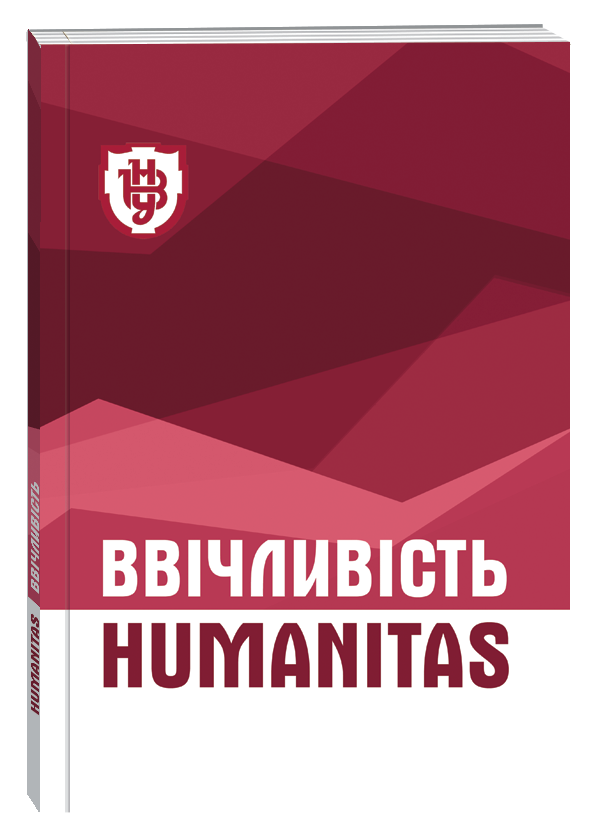INNOVATIVE TECHNOLOGIES OF PSYCHOLOGICAL AND PEDAGOGICAL SUPPORT IN THE PROCESS OF INCLUSIVE EDUCATION FOR CHILDREN WITH INTELLECTUAL DISABILITIES
DOI:
https://doi.org/10.32782/humanitas/2025.2.19Keywords:
ecosystem approach, inclusive education, children with SEN, adaptive technologies, virtual reality, social advertisingAbstract
Inclusive education in modern society is not only an educational strategy, but also a key direction of social integration of children with special educational needs (SEN). Children with intellectual disabilities require special attention, for whom the creation of an adaptive and supportive environment is a critical factor in development and socialization. Modern psychological and pedagogical practices require transformation in accordance with the principles of humanistic psychology, individualized learning and interdisciplinary interaction. The relevance of the topic is enhanced by the growing need to use the latest digital technologies to ensure an effective educational process and individualized support for children with SEN. Purpose. The purpose of the study is to analyze modern psychological and pedagogical approaches and digital technologies used in inclusive education for the effective support of children with intellectual disabilities, taking into account the ecosystem vision of their development in interaction with the social environment. Methodology. The study uses a comprehensive theoretical and analytical approach using methods of system analysis, comparative study of pedagogical practices, and critical reflection on modern models of inclusive education. The conceptual framework is based on the ecosystem approach (U. Bronfenbrenner, R. Lerner, B. Little), which considers the development of a child in the context of its multi-level interaction with micro-, meso-, macro-, and chronosocial systems. Special attention is paid to the analysis of the potential of adaptive digital platforms, VR/AR technologies, and multisensory environments in the context of psychological and pedagogical support. Scientific novelty. For the first time in the Ukrainian context, the possibilities of integrating an ecosystem approach to psychological and pedagogical support using modern digital technologies in working with children with intellectual disabilities have been comprehensively revealed. It is substantiated that the effectiveness of inclusive education largely depends on the dynamic interaction of all subjects of the educational environment, taking into account the child's personal projects and the use of tools capable of providing flexible individualization of the learning process. For the first time, the effectiveness of such technologies as Smart Sparrow, Knewton, Oculus Rift, Microsoft HoloLens in the context of inclusive education in conditions of intellectual disabilities has been analyzed. Conclusions. The use of an ecosystem approach in combination with modern digital technologies provides a qualitatively new level of psychological and pedagogical support for children with intellectual disabilities. This allows not only to form an adaptive educational environment, but also to actively promote the self-realization of the child as a full-fledged subject of the educational process. Further research into the impact of innovative technologies on the dynamics of the development of key social and cognitive skills in children with SEN, as well as the formation of models of partnership interaction of all participants in the educational process in an inclusive space, is promising.
References
Дослідження ефективності соціальної реклами / Інститут соціальної та політичної психології НАПН України. URL: http://ispp.org.ua (дата звернення 12.03.25)
Закон України «Про освіту» (розділ про інклюзивну освіту) від 5 вересня 2017 р. № 2145-VIII. Верховна Рада України. URL: https://zakon.rada.gov.ua/laws/show/2145-19 ( Дата звернення 9.03.25)
Кампанія «Дивись ширше» / ЮНІСЕФ Україна. URL: https://www.unicef.org/ukraine ( Дата звернення 19.03.25)
Постанова Кабінету Міністрів України «Про затвердження Положення про інклюзивно-ресурсний центр» від 12 липня 2017 р. № 545 [Електронний ресурс]. URL: https://zakon.rada.gov.ua/laws/show/545-2017-п ( Дата звернення 12.03.25)
Соціальна кампанія «Інклюзія починається з тебе» / Міністерство освіти і науки України. URL: https://mon.gov.ua/ua/tag/inklyuzivna-osvita ( Дата звернення 8.03.25)
Boot F. H., Owuor J., Dinsmore J., MacLachlan M. Access to assistive technology for people with intellectual disabilities: A systematic review to identify barriers and facilitators. Journal of Intellectual Disability Research. 2018. Vol. 62, No. 10. С. 90–98.
Bronfenbrenner U. Making Human Beings Human: Bioecological Perspectives on Human Development. Thousand Oaks, CA: SAGE Publications, 2005. 336 с. URL: https://us.sagepub.com/en-us/nam/making-human-beings-human/book225589 (дата звернення 15.03.25)
European Agency for Special Needs and Inclusive Education. Reports and research studies. URL: https://www.european-agency.org (дата звернення 12.03.25)
Individuals with Disabilities Education Act (IDEA) [Електронний ресурс]. URL: https://sites.ed.gov/idea (дата звернення 5.03.25)
Knewton Adaptive Learning Platform. URL: https://www.knewton.com (дата звернення 12.03.25)
Lerner R. M., Overton W. F. Handbook of Child Psychology and Developmental Science, Volume 1: Theory and Method. Hoboken, NJ: Wiley, 2017. 912 с. URL: https://www.wiley.com/en-us/Handbook+of+Child+Psychology+and+ Developmental+Science-p-9781118136850 (дата звернення 11.03.25)
Little B. R. Who Are You, Really? The Surprising Puzzle of Personality. New York: TED Books, 2017. 128 с. URL: https://www.ted.com/books/who-are-you-really (дата звернення 10.03.25)
Meyer A., Rose D. H., Gordon D. Universal Design for Learning: Theory and Practice. Wakefield, MA: CAST Professional Publishing, 2014. URL: http://udltheorypractice.cast.org (дата звернення 12.03.25)
Microsoft HoloLens – Mixed Reality Technology. Режим доступу: https://www.microsoft.com/en-us/hololens (дата звернення 8.03.25)
Oculus Rift – Virtual Reality Technology. Режим доступу: https://www.oculus.com/rift (дата звернення 8.03.25)
Parsons S., Cobb S. State-of-the-art of virtual reality technologies for children on the autism spectrum. European Journal of Special Needs Education. 2011. Vol. 26, No. 3. С. 355–366.
Scope UK – End the Awkward Campaign. Режим доступу: https://www.scope.org.uk/campaigns/end-the-awkward ( Дата звернення 11.03.25)
Smart Sparrow Adaptive Learning Platform. URL: https://www.smartsparrow.com ( Дата звернення 12.03.25)
Think Inclusive Campaign. URL: https://www.thinkinclusive.us ( Дата звернення 10.03.25)
UNICEF. Inclusive Education Reports. URL: https://www.unicef.org/education/inclusive-education (дата звернення 12.03.25)







